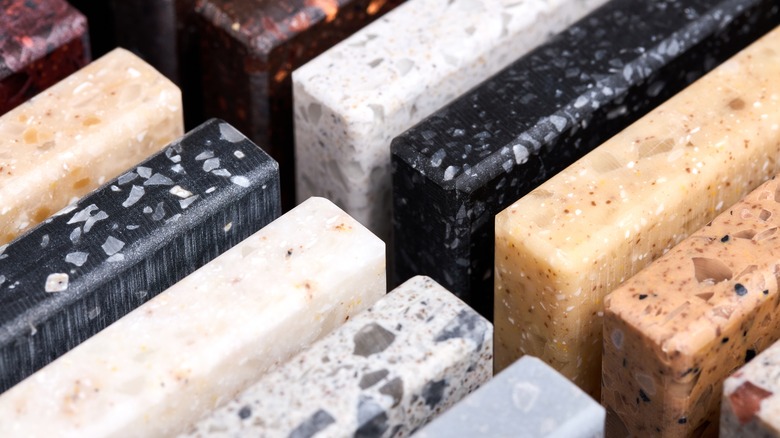Porcelain Vs Quartz: Our Stone Countertop Expert Reveals Which Is The Better Option
If you're not familiar with the differences between quartz and porcelain kitchen countertops, picking one over the other can be an overwhelming task. That said, fret not: In an exclusive interview with House Digest, owner and CEO of Proslit Tile & Stone, Irakli Khizanishvili, shared a full list of things to consider when deciding between the two materials. And, while his own preference is for quartz, he explained that there are benefits to choosing porcelain, too.
Asked which material he liked best, between quartz and porcelain, Khizanishvili explained that he'd opt for the former, personally. "Overall, I would lean towards quartz for its superior durability, lower maintenance requirements, and consistent quality," he said. Expanding on that, he pointed out that quartz was a no-brainer for anyone with a busy kitchen. "Quartz is highly resistant to scratches, stains, and impact," he explained. Khizanishvili added that when it came to maintenance, quartz was a clear winner, once again. Since quartz doesn't have the porosity of natural stone, he noted, there's no need for sealing and re-sealing quartz countertops. Plus, he said, the stone is mold- and bacteria-resistant.
That's still not all, though. Khizanishvili also noted that when it came to aesthetics, quartz was a great option, as it's possible to get slabs in a variety of patterns. No need to re-think the design of your kitchen, here! Having said that, he also shared some noteworthy reasons why one might consider porcelain instead.
Porcelain countertops may be a better bet for busy cooks
Speaking exclusively to House Digest, Irakli Khizanishvili noted that while the benefits of quartz countertops are many, there are some drawbacks that might lead one to pick porcelain, instead. Chiefly, he noted, using high heat is one thing you should never do if you have quartz countertops. That isn't the case with porcelain, though.
With that in mind, Khizanishvili explained that anyone with a penchant for cooking hot meals on the regular (and who might not be inclined to constantly popping down something like a trivet — no judgment) would benefit from going the porcelain route. After all, your kitchen should be designed around you, not the other way around, so rather than end up with a damaged countertop, or ending up frustrated every time you cook a meal, simply choose the option that best fits your lifestyle.
Luckily, going with porcelain doesn't mean those considering using it will have to sacrifice the aesthetics portion. Quite the contrary, Khizanishvili noted that porcelain is a marble countertop look-alike often used as an alternative to natural stone. Plus, even if it's not being used to mimic marble, he pointed out that porcelain is a natural material in itself, making it the perfect choice for anyone who generally prefers that look.
The choice between quartz and porcelain is personal
At the end of the day, the choice between quartz and porcelain kitchen countertops is a personal one. As Irakli Khizanishvili exclusively told House Digest, homeowners who are considering new countertops should keep their day-to-day lifestyle and personal taste at the forefront of their decision.
"It's important for homeowners to assess their specific needs and lifestyle when choosing between porcelain and quartz countertops," he said. In other words, don't be tempted to think you'll adapt to the maintenance requirements for a material. Ultimately, Khizanishvili added, "Factors such as kitchen usage, maintenance willingness, budget, and aesthetic preferences play significant roles in making the best choice."
Of course, there's no harm in reaching out to a professional in your area for more tailored advice. In fact, Khizanishvili strongly recommends anyone looking at new countertops do just that. "Consulting with a professional can provide further personalized advice and help in selecting the most suitable material," he said. Whichever material you end up choosing, be sure to do as much research as possible. In the meantime, Khizanishvili's expert advice is a stellar starting point.



